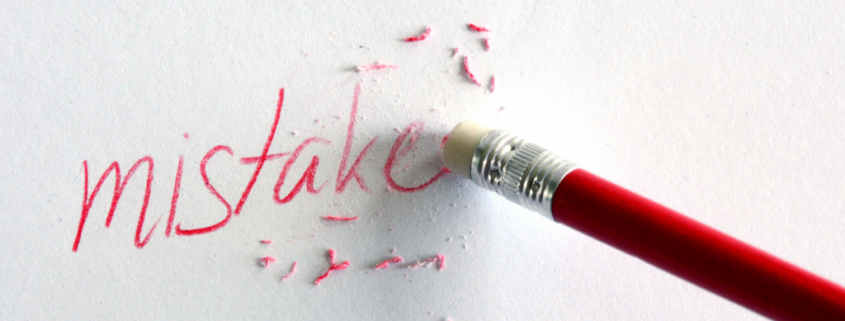The Fear of Making Mistakes at Work
The Covid-19 crisis and its fallout — including recession, layoffs, and uneven economic pain — as well as recent protests over police brutality and demands for racial justice have presented many of us with challenges that we’ve not encountered before. The high-stakes and unfamiliar nature of these situations have left many people feeling fearful of missteps. No one can reduce mistakes to zero, but you can learn to harness your drive to prevent them and channel it into better decision making. Use these tips to become a more effective worrier.
As they say, everyone makes mistakes. In many situations, you can correct your error or just forget about it and move on. Making a mistake at work, however, is more serious. It can have a dire effect on your employer. It may, for example, endanger a relationship with a client, cause a legal problem, or put people’s health or safety at risk. Repercussions will ultimately trickle down to you. Simply correcting your error and moving on may not be an option. When you make a mistake at work, your career may depend on what you do next.
The current culture that is perpetuated glorifies fearlessness. The traditional image of a leader is one who is smart, tough, and unafraid. But fear, like any emotion, has an evolutionary purpose and upside. Your concern about making mistakes is there to remind you that we’re in a challenging situation. A cautious leader has value. This is especially true in times like these. So don’t get caught up in ruminating: “I shouldn’t be so fearful.”
Use emotional agility skills
Fear of mistakes can paralyse people. Emotional agility skills are an antidote to this paralysis. This process starts with labelling your thoughts and feelings, such as “I feel anxious I’m not going to be able to control my customers enough to keep my staff safe.” Stating your fears out loud helps diffuse them. It’s like turning the light on in a dark room. Next comes accepting reality. For example, “I understand that people will not always behave in ideal ways.” List off every truth you need to accept. Then comes acting your values. Let’s say one of your highest values is conscientiousness. How might that value apply in this situation? For example, it might involve making sure your employees all have masks that fit them well or feel comfortable airing any grievances they have. Identify your five most important values related to decision-making in a crisis. Then ask yourself how each of those is relevant to the important choices you face.
Repeat this process for each of your fears. It will help you tolerate the fact that we sometimes need to act when the best course of action isn’t clear and avoid the common anxiety trap whereby people try to reduce uncertainty to zero.
Apologise, but keep it simple
Genuinely say the words, “I’m sorry, I made a mistake,” and offer how you plan to correct it. Resist the urge to offer excuses or to start apologising repeatedly. On the other hand, don’t overdo it trying to make it up. Stay professional and business-minded, recognising how valuable company time is.
An apology conveys several major things: regret of the mistake, responsibility for it, and respect for the company and people in it. An apology also offers the opportunity for the other people to let go of their anger. The moment the apology is genuinely made is the moment that you can work to rebuild.
You can’t change the past but you can find a solution for the here and now. One apology to the right person or people along with a possible solution will come across much more positively than a bunch of unnecessary filler words and statements to the entire office.
Accept the consequences in stride
The management and the HR team can decide that you need another form of reprimanding. Or they can take you up on your offer on how you’ll correct the mistake. Whatever the case, accept the consequences and carry out your tasks without complaining.
This reinforces your apology and will likely generate additional respect. Whether it’s staying after work for a few days in order to remedy the work, reaching out to the wronged person, or going about your normal work tasks, do it and do it well. Don’t just say you’re sorry, show them through your actions. Be a better worker.
Broaden your thinking
When we’re scared of making a mistake, our thinking can narrow around that particular scenario. Imagine you’re out walking at night. You’re worried about tripping, so you keep looking down at your feet. Next thing you know you’ve walked into a lamp post. Or, imagine the person who is scared of flying. They drive everywhere, even though driving is objectively more dangerous. When you open the aperture, it can help you see your greatest fears in the broader context of all the other threats out there. This can help you get a better perspective on what you fear the most.
It might seem illogical that you could reduce your fear of making a mistake by thinking about other negative outcomes. But this strategy can help kick you into problem-solving mode and lessen the mental grip a particular fear has on you. A leader might be so highly focused on minimising or optimising for one particular thing, they don’t realise that other people care most about something else. Find out what other people’s priorities are.
Given our current situation knowing that your colleagues or employees are best suited for this new scenario we find ourselves in. Finding the right talent, the best fit for the job and your organisation can be a very challenging task. It is now important to find out whether your managers or your team is well-equipped of working together from various locations. It requires deep knowledge of their personalities, strengths, weaknesses, interests, work style and other characteristics. Our technology and solutions will do the work for you, helping you discover if your people are resilient during times of hardship, if they are autonomous, if they are team players, without actual human contact. Given that our platform is cloud-based, everyone can use it from home as well. Humanity finds itself at a crossroad for various reasons now, why not help people discover and develop themselves from the comfort of their own homes?
Request a free demo:

Sources:
https://www.thebalancecareers.com/mistakes-at-work-526244
https://www.inc.com/john-discala/4-ways-to-bounce-back-after-making-a-mistake-at-work.html
https://hbr.org/2020/06/how-to-overcome-your-fear-of-making-mistakes?ab=hero-subleft-3











